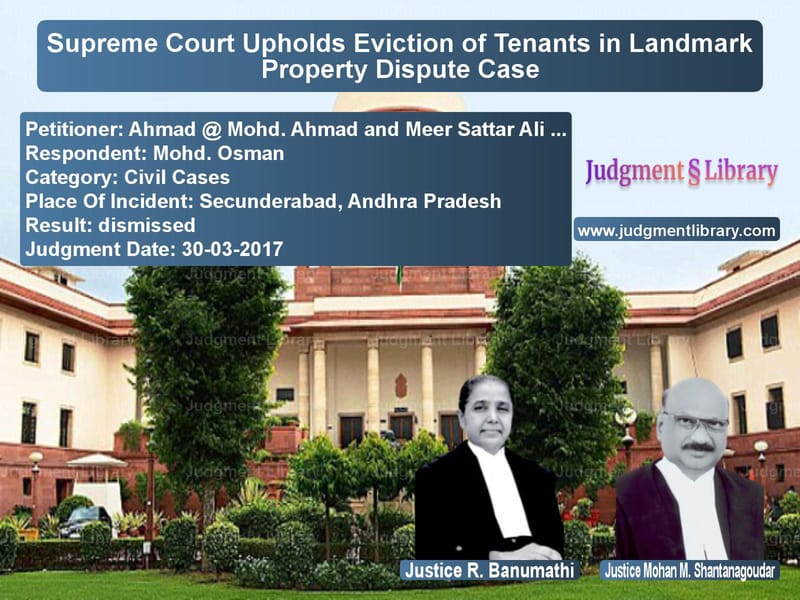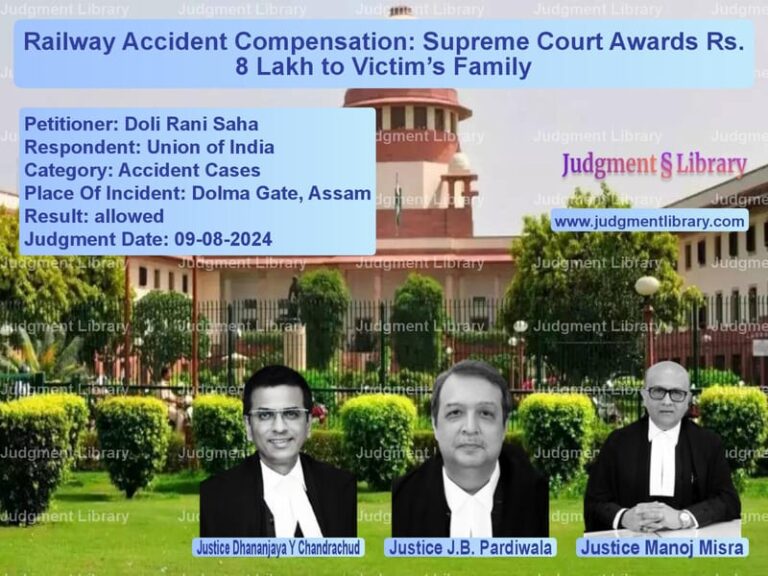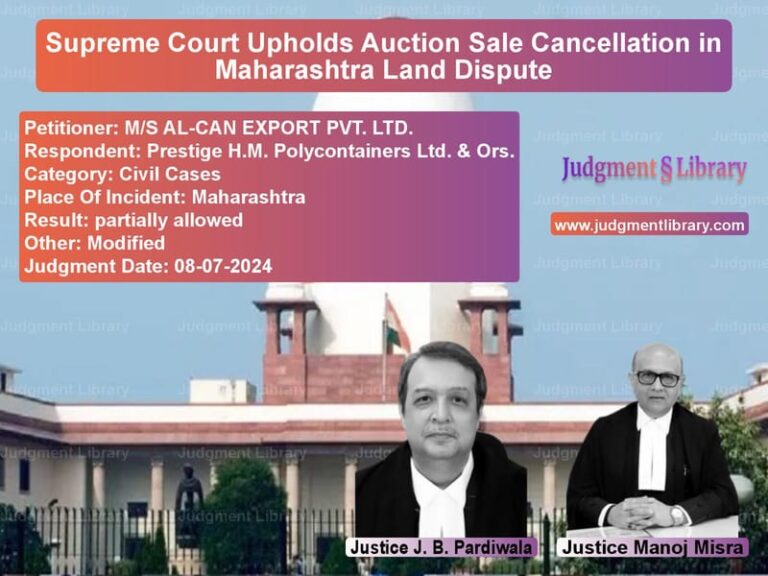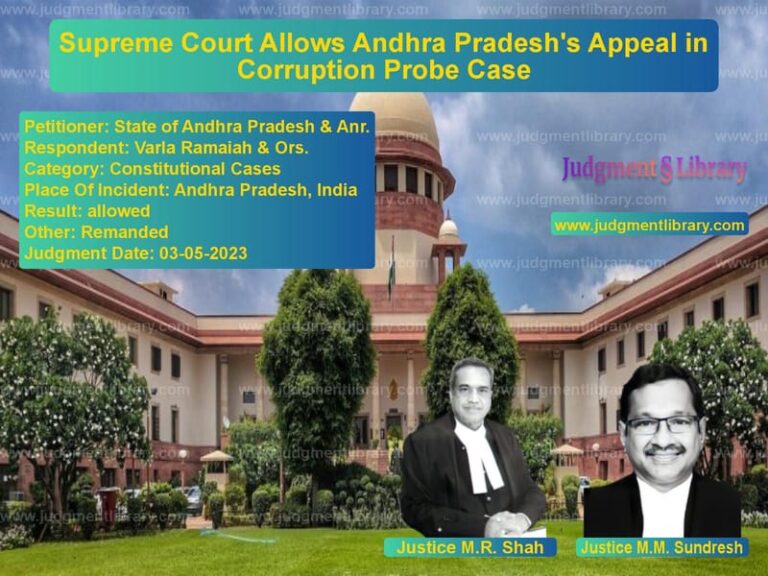Supreme Court Upholds Eviction of Tenants in Landmark Property Dispute Case
The Supreme Court of India recently ruled on a significant property dispute case, reaffirming the rights of the landlord over encroached government property and directing tenants to vacate the premises. The judgment, delivered in the appeals filed by Ahmad @ Mohd. Ahmad and Meer Sattar Ali (dead) by legal representatives against Mohd. Osman, upheld the eviction orders passed by the Rent Appellate Tribunal and the Andhra Pradesh High Court.
The case revolved around the eviction petitions filed by the respondent (Mohd. Osman) against the appellants under the Rent Control Act, alleging default in rent payment and a requirement for bona fide additional accommodation. The tenants contested the eviction, asserting that the landlord had no valid title over the property as it was government-owned land.
Background of the Case
The respondent-landlord initiated eviction proceedings in Rent Control cases numbered R.C. No.33 of 1997 and R.C. No.125 of 1997 against Ahmad alias Mohd. Ahmad and Meer Sattar Ali, respectively. The eviction petitions were initially dismissed by the Principal Rent Controller and the Junior Civil Judge-Cum-Additional Rent Controller, Secunderabad, citing the absence of a landlord-tenant relationship.
However, upon appeal, the Additional Chief Judge of the City Small Causes Court, Hyderabad, reversed the findings, ruling in favor of the landlord. The High Court of Andhra Pradesh upheld this decision in Civil Revision Nos. 2374 and 2375 of 2004, leading to the current appeals before the Supreme Court.
Arguments Presented by the Parties
Arguments of the Appellants (Tenants)
- The tenants argued that both they and the landlord were encroachers on government land, and thus, there was no valid landlord-tenant relationship.
- They contended that denying the landlord’s title was justified since one encroacher could not seek eviction of another encroacher.
- They insisted that the eviction petitions were unsustainable as the respondent did not have a valid ownership title over the premises.
Arguments of the Respondent (Landlord)
- The landlord provided documentary evidence of ownership, including registered sale deeds from 1911 and 1912, proving that his father was the absolute owner of the property.
- He highlighted a previous court ruling in O.S. No.3292 of 1979, which had confirmed the ownership of the property and led to the eviction of illegal occupants.
- The landlord also furnished assessment records from the Secunderabad Cantonment Board and a revenue officer’s certificate affirming private ownership of the premises.
Supreme Court’s Observations and Judgment
The Supreme Court meticulously analyzed the documentary evidence and previous legal rulings in the matter. The Court noted that:
- The title deeds clearly established the respondent’s ownership over the property.
- Judicial precedents, including the ruling in O.S. No.3292 of 1979, had already determined the landlord’s ownership.
- The assessment records from municipal authorities corroborated the respondent’s claim of ownership.
- The tenants failed to establish any independent right over the property and could not substantiate their claims that the land belonged to the government.
Concluding that the denial of ownership by the tenants was not bona fide, the Supreme Court dismissed the appeals and upheld the eviction orders. The Court directed the tenants to hand over vacant possession of the premises to the landlord by December 31, 2017, subject to an undertaking filed within four weeks.
Impact of the Judgment
This ruling sets a strong precedent in property disputes involving landlord-tenant relationships, particularly in cases where ownership titles are contested. It underscores the significance of documentary evidence in property claims and reiterates that mere occupation of premises does not confer ownership rights.
The judgment reinforces the principle that a valid titleholder can seek eviction of occupants even if there are allegations of encroachment, provided the titleholder can prove ownership through registered documents and prior court rulings.
Conclusion
The Supreme Court’s decision in this case upholds the principles of property law and landlord-tenant relationships. It highlights the importance of establishing ownership through legal means and ensures that tenants cannot misuse the lack of documentation to evade eviction. The ruling serves as a significant legal precedent for similar property disputes in India.
Don’t miss out on the full details! Download the complete judgment in PDF format below and gain valuable insights instantly!
Download Judgment: Ahmad @ Mohd. Ahmad vs Mohd. Osman Supreme Court of India Judgment Dated 30-03-2017.pdf
Direct Downlaod Judgment: Direct downlaod this Judgment
See all petitions in Property Disputes
See all petitions in Landlord-Tenant Disputes
See all petitions in Specific Performance
See all petitions in Judgment by R. Banumathi
See all petitions in Judgment by Mohan M. Shantanagoudar
See all petitions in dismissed
See all petitions in supreme court of India judgments March 2017
See all petitions in 2017 judgments
See all posts in Civil Cases Category
See all allowed petitions in Civil Cases Category
See all Dismissed petitions in Civil Cases Category
See all partially allowed petitions in Civil Cases Category







